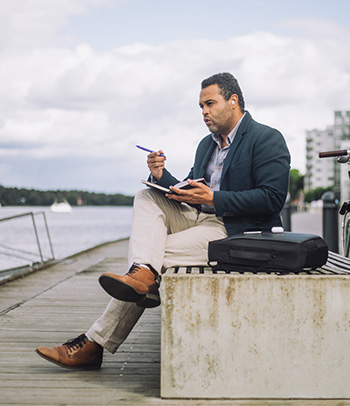Certain lifestyle changes may help you relieve or reduce your anxiety symptoms.
It’s natural to experience anxiety surrounding stressful moments in your life, like an upcoming job interview, an unexpected medical bill or a past trauma. Some Veterans may develop anxiety following a life-threatening experience during service or during a difficult transition to civilian life.
But when your anxiety continues and begins to impact your quality of life, it may be time to take action. Learn more about anxiety, tips for controlling it and resources that can help.
What Is Anxiety?
Anxiety usually involves a persistent feeling of apprehension or dread that doesn’t go away. Anxiety is often related to the anticipation of a threat, but it can occur even when there’s no immediate threat. Anxiety triggers the body’s fight or flight response, causing your heart to beat faster and your muscles to tense up. For people with an anxiety disorder, these feelings can become overwhelming and interfere with everyday life, relationships, work and more.
There are several different anxiety disorders, including generalized anxiety disorder, panic disorder, social anxiety disorder and various phobia-related disorders. You can learn more about each disorder and download a screening checklist to help you determine what your symptoms may mean.
What Symptoms Are Related to Anxiety?
Anxiety can cause a range of symptoms affecting you both physically and emotionally, including:
- Excessive worrying about everyday decisions
- A racing heart or cold, clammy hands
- Feeling restless, jumpy or on edge
- Trembling or twitching
- Difficulty concentrating
- Difficulty sleeping
- Trouble catching your breath
- Feeling dizzy, lightheaded or nauseous
When these symptoms are not managed and persist over time, they can become debilitating. They may make it hard to participate in activities, maintain healthy relationships or be successful at work.
How Can I Cope With My Anxiety?
Certain lifestyle changes may help you relieve or reduce your anxiety symptoms. Here are some tips based on suggestions from the National Institute of Mental Health:
- Learn what triggers your anxious feelings. Can you determine what causes you to become anxious? Is it a particular sound like yelling? Or a certain memory or past trauma? Knowing what triggers your anxiety may make it easier to manage.
- Take care of yourself. In order to manage your anxiety, it’s important to feel your best. Physical activity, a healthy diet and getting enough sleep can help to improve your mood and manage your stress.

- Practice relaxation techniques. Having a way to calm yourself down when you begin to feel anxious is important. This can be as simple as taking a few deep breaths, downloading a calming app to your phone, journaling when you become upset or learning more about mindfulness and meditation. You can incorporate techniques such as the 5-4-3-2-1 activity, which involves stopping to notice five things you can see, four things you can feel, three 3 things you can hear, two things you can smell and one thing you can taste. This exercise helps you focus on your immediate surroundings and what is happening in the moment.
- Stay connected. Having a purpose and feeling connected to causes or people can help you manage your stress and anxiety. Consider volunteering, joining a club or scheduling regular time to connect with friends and family. Having people to talk to may help when you’re feeling anxious.
- Take breaks. In a world where we have access to constant information, including negative news stories and hateful speech, it can be upsetting and anxiety-inducing to see it all day long. Try disconnecting and limiting the amount of news you consume.
- Avoid too much caffeine or nicotine. These are both stimulants and can contribute to your body feeling jittery, on edge or jumpy.
- Determine what coping techniques work for you. It may take some trial and error but having one to two techniques you can count on when you start to feel overwhelmed can be helpful. Maybe it’s one of the mindfulness strategies listed above, or maybe it’s a walk in the woods or a few minutes on the couch listening to your favorite music.
- Get additional support and treatment. These coping techniques may not be enough to manage your anxiety. If you feel like your anxiety is interfering with your quality of life, consider reaching out for support and learn more about different treatment options.
- The Department of Veterans Affairs has several mental health resources, including evidence-based treatments for anxiety such as therapy, medication and more. In some cases, anxiety occurs alongside other mental health conditions such as depression or post-traumatic stress disorder. Your provider can help determine the best treatment option for your specific needs.
Resources
- Make the Connection shares the stories of several Veterans who have learned to manage their anxiety through therapy, support groups and more.
- The National Institute of Mental Health has a video full of techniques to manage stress and anxiety, including practicing gratitude, exercising and finding ways to relax. They also provide a lot of information about each type of anxiety disorder, as well as different treatment options.
- The National Institutes of Health has an emotional wellness toolkit that offers tips for improving your overall emotional health.
Don’t let anxiety take over your life. Take control and get the support you deserve.







